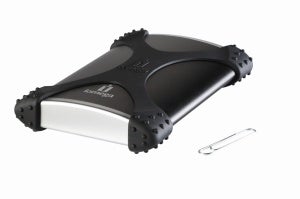It’s getting tougher to differentiate the various portable hard drives on the market today. After all, they’re all light and store a lot of stuff, right?
The Iomega eGo BlackBelt adds a new twist, or rather a bounce. The 250GB external drive, which sells for $120, includes what Iomega calls Drop Guard Xtreme technology for protecting hard drives against damaging shocks, usually from falls. In theory, Blackbelt should last longer than flimsier alternatives.
Iomega claims the technology, which essentially consists of a rubberized bumper band stretched around its frame, protects the unit from falls of up to seven feet. The company says that’s double the industry average for shock protection.
Bouncy, Bouncy
Hard drives traditionally have been very susceptible to any shock. Dropping a drive, or even jarring it, can destroy it and all your data, so if the shock absorption technology used is as effective as Iomega claims, this is an important feature.
How to test it? We were sorely tempted to bounce it off the floor repeatedly, but were we really prepared to trash the product?
 |
| Rubberized bumpers help protect the Iomega eGo Blackbelt drive from falls of up to 84 inches. |
And when Iomega says the product can withstand an 84-inch fall, does it mean you can drop it on a tile floor from that height or only onto a plush carpet? Also, we’re assuming that all bets are off if the drive is attached by its USB cable and running – that’s when hard disks are most vulnerable to shock.
We started with a modest 36-inch drop onto a padded chair but still cringed – that would be enough to KO some drives. No problem. Next we tried dropping it from about 54 inches on to hemp carpet over a tile floor. And, miraculously, the BlackBelt survived.
At this point, we decided, if it can survive a 70-inch fall onto the same moderately hard surface, we’ll take the 84 inches on trust. The BlackBelt bounced a couple of times – and came up smiling. Afterwards we were able to access and play the video files used to test the data transfer. We decided not to tempt fate any further.
Moderately Fast
If you’re going to use this as portable backup – which is an excellent idea – then you don’t want to be waiting an age for your files to upload from PC to drive.
The drive is rated at 480 megabits per second (Mbps), assuming you’re connecting it to a USB 2.0 port. The data transfer rate is important if you’re going to use the drive to store media – audio and video – and then stream programming from the drive to your PC; 480 Mbps is plenty fast enough for that.
But what happens when you have to transfer a large volume of data from PC to eGo as in some backups? We put it to the test, measuring the time to upload a 7.57 GB block of files. It took six minutes, 17 seconds.
Note: this isn’t necessarily how long it would take to backup 7.57 GB of data. The time to back up would depend on how you were doing it and whether you were using encryption and/or data compression. It would take longer.
For comparison, we uploaded the same 7.57 GB block of files to the Seagate FreeAgent Go, which is also rated at 480 Mbps – a fairly standard spec for portable USB drives. It took almost exactly the same amount of time, within seconds.
Free Backup Software
The eGo Blackbelt also comes with EMC Retrospect backup software – a serviceable but not terribly user-friendly application – plus 2 GB of free MozyHome online backup capacity from Mozy.
The MozyHome backup works well and it’s easy to set up, but Iomega isn’t really doing any great favors by including it. Mozy gives away 2 GB of backup storage and the software to anyone who comes to its Web site. Also worth noting: both Iomega and Mozy are now EMC companies. It’s called synergy.
Sizing Up the Competition
There is a bit more you can say about a portable hard drive, of course. For example, just how small and light is it? And how does that compare to similar products?
The eGo BlackBelt’s chassis is a little chunkier than some portable drives, and it offers the protective rubber halter as well. Iomega lists the dimensions as .75 x 3.5 x 5.25 inches and the weight as .48 pounds (just under eight ounces.)
Seagate’s FreeAgent Go, which is slightly ‑‑ but significantly ‑‑ sleeker at .49 x 3.15 x 5.12 inches and 5.64 ounces. That may not sound like much of a difference, but you can slip the Seagate product into a shirt pocket quite comfortably, something you can’t do with the BlackBelt – though it would fit easily in briefcase or purse.
Of course, Seagate makes no claims about what happens if you drop the FreeAgent Go. Smithereens? Also, if you want ultimate sleekness, Iomega offers a similar-sized product in eGo Helium – but without the shock resistance.
Bottom Line
If you need a sturdy portable drive, either for backup or to carry large media files around – to show work in progress to a client, for example – the Iomega BlackBelt looks like a good, inexpensive, solution. And the best part is that you don’t have to worry about losing everything if the drive slips from your butter fingers.
Based in London, Canada, Gerry Blackwell has been writing about information technology and telecommunications for a variety of print and online publications since the 1980s.
| Do you have a comment or question about this article or other small business topics in general? Speak out in the SmallBusinessComputing.com Forums. Join the discussion today! |

